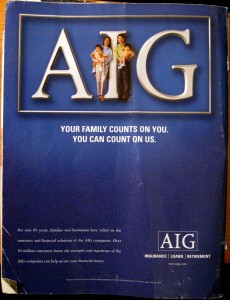Newly released AIG emails further impugn Tim Geithner
What would you think about the Federal Reserve Bank of New York telling AIG to intentionally withheld from public scrutiny that AIG was paying 100 cents on the dollar for credit default swaps at the same time that AIG was crying for a bailout from the public, thereby hiding from the public that the public was functionally bailing out Goldman Sachs and other large banks? What would you think about the fact that Tim Geithner headed the New York Federal Reserve when this was going on? Eliot Spitzer, William K. Black and Frank Partnoy sum up the issue:
Today, a Bloomberg story revealed that under Timothy Geithner's leadership, the Federal Reserve Bank of New York told AIG to withhold details from the public about its payments to banks during the crisis. This information was discovered when emails between the company and the Fed were requested by representative Darrell Issa, ranking member of the House Oversight and Government Reform Committee.Who owns AIG? The taxpayers own 80% of it. Therefore, AIG should release the emails. Who can and should make this decision?
The taxpayer's stake in AIG is held by the A.I.G. Credit Facility Trust, whose three trustees are Jill M. Considine, a former chairman of the Depository Trust Company and a former director of the Federal Reserve Bank of New York; Chester B. Feldberg, a former New York Fed official who was chairman of Barclays Americas from 2000 to 2008; and Douglas L. Foshee, chief executive of the El Paso Corporation and chairman of the Houston branch of the Federal Reserve Bank of Dallas. We call on these three officials (interestingly all former Fed officials) to immediately release the documents we request. The value of these documents, if it were ever in doubt, was certainly proved by today's revelations. Release the emails.See also, this earlier post on a NYT op-ed by Spitzer, Black and Partnoy.


